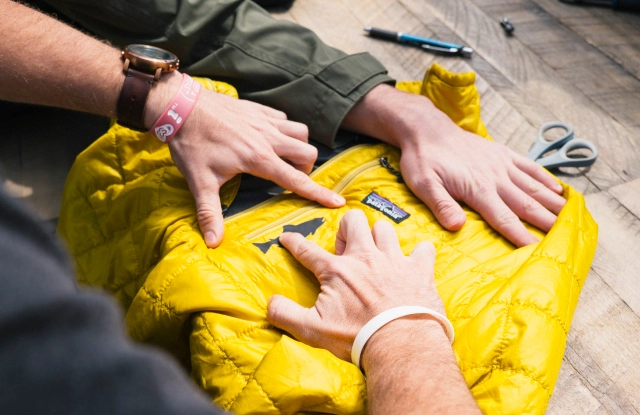Patagonia, Levi’s and The North Face Top Kearney’s Circular Fashion Index
Gucci, Coach and Burberry are front-runners for the luxury category.

Patagonia, Levi’s and The North Face are the brands most committed to fashion circularity, according to research by Kearney.
The global management consulting firm has released its latest Circular Fashion Index, or CFX, a ranking that measures fashion brands’ efforts toward extending the life cycle of their clothes.
Compared to the first CFX introduced in 2020, the ranking this year expanded its scope to assess 150 global brands representing 20 countries and six categories. These were luxury; premium and affordable luxury; mass market; fast fashion; sports and outdoor, and underwear and lingerie.
As per the index, a company’s circularity performance is scored based on seven aspects that affect the garments’ longevity, taking into consideration both primary and secondary markets. Examples for the former category include assessing the percentage of recycled fabrics used to craft new products or the promotion of circularity in a brand’s communication, while for the latter, secondhand sales, rental services and reuse of returned clothes were valued. Each aspect was given a score between one and 10 and companies’ overall scores were a combination of these.
The first CFX in 2020 reported an average score of just 1.6 out of 10 across all examined brands. Consumers’ and companies’ increasing attention toward fashion’s environmental impact over the past two years influenced the 2022 ranking, which showed a slight improvement of the industry registering an average score of 2.97 out of 10 across all brands.
Yet this figure highlighted that the road to circularity in fashion is still long.
According to the research, only 7 percent of brands regularly employ recycled materials, 54 percent of companies use them just for a few selected items or product features, while 39 percent use no recycled materials at all. Even if communication and promotion of circularity efforts are among the fastest measures to implement, 44 percent of brands don’t do it at all, and 40 percent of companies give the minimum amount of care instructions required by law.
As for actions demanding higher commitment, only 5 percent — mostly luxury brands — offer extensive repair services and just 2 percent of the brands provide rent or lease ones, for example.
Patagonia, Levi’s and The North Face reported scores of 8.50, 8.20 and 8.05, respectively, improving their performance versus 2020. Some implementations propelled the growth, such as Patagonia’s equipment rental program with the gear-renting platform Awayco and enhanced use of recycled fabrics.
In the top 10 global ranking, Esprit came fourth, followed by OVS, Gucci, Gant, Coach, Lululemon Athletica and Lindex.
In particular, OVS and Gucci improved their scores, jumping from the 17th and 15th positions they had in 2020, respectively, to the fifth and sixth this year.
OVS increased its commitment to recycled fabrics, starting from a 65 percent share of the 2020 collection made with reduced-impact materials and aiming to reaching 90 percent of recycled fabrics by 2025. Improved care instructions, repair services available in some stores and donation of pre-owned clothes to charity were among other implementations that boosted the score of the Italian brand.
Gucci, which intensified efforts with the Gucci Equilibrium and Off the Grid projects as well as increased the communication around product longevity and circularity, led the top 10 list for the luxury category specifically, ranking ahead of Coach and Burberry. The other luxury companies in the list were Louis Vuitton, Saint Laurent, Alexander McQueen, Balenciaga, Dior, Prada and Hermès.
Gant topped the premium and affordable luxury ranking, followed by Cos and Sandro. The Kooples and Tommy Hilfiger came fourth and fifth, respectively, while this segment’s top 10 also included Free People, Hollister, Abercrombie & Fitch, Ralph Lauren and Timberland.
The ranking for mass market included Levi’s, Esprit and OVS, while Crocs and Uniqlo featured in fifth and seventh positions, respectively.
In the fast-fashion arena, Jules/Brice, Tape à l’oeil and H&M reported the top three scores. Zara and Bershka ranked seventh and eighth, respectively.
For the sports and outdoor segment, Lululemon Athletica ranked third, following Patagonia and The North Face. The other companies in this ranking were Columbia, Decathlon, New Balance, Adidas, Nike, Mizuno and Merrell.
As for underwear and lingerie brands, Etam, Wolford and Intimissimi reported the top three scores. Calzedonia, Yamamay and Victoria’s Secret also featured in this category’s list, ranking fifth, seventh and eighth, respectively.
Overall, luxury and premium brands reported the highest scores due to their extensive care instructions and repair services implemented to answer more demanding consumers, while the fast-fashion and lingerie brands had the lowest scores due to the nature of their business model and because secondhand or rental services are harder to introduce in these segments.
Almost 75 percent of total brands came from France, Italy, Germany and the U.S. Although France had no brands in the top 10, it reported the highest average score among these countries — 3.65 out of 10 — followed by Italy. Even if the U.S. is the home of the top three CFX global brands, it ranked third as a number of poor-performing labels brought down its average score to 2.95.
